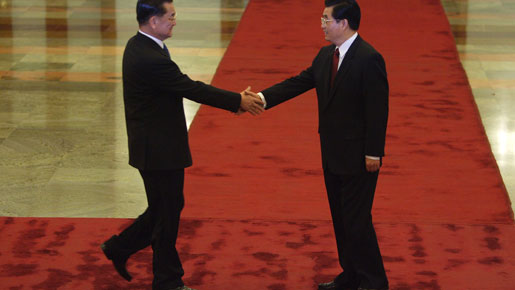
Economically booming China has wooed Taiwan with promises of better economic ties and a shared Chinese cultural heritage, reserving harsh words for U.S. military support of the self-ruled island, including a recent arms sale deal.
China’s top leader, Hu Jintao, has made improving relations with Taiwan one of the legacies of his tenure.
“Of course, Cross-Straits relations are a heavy responsibility and there’s a long road ahead, and could run into difficulties and obstacles along the way,” Xinhua said, in an editorial praising Hu Jintao’s approach on the Lunar New Year, the holiday marked by family reunions in Chinese culture.
“We must recognise that the new approach to Cross-Straits relations did not come easily, take a broad view, and promote the policy of improving Cross-Straits relations and peaceful development as a political basis for the mainland and Taiwan belonging to One China.”
Xinhua commentaries reflect official government policy.
Hu met with businessmen from Taiwan on Chinese New Year’s Eve, and praised their investments in Fujian province, which shares cultural ties with nearby Taiwan.
The businessmen invested in agricultural projects, in line with a different drive by the Hu administration to promote investment and processing industries in the poorer countryside.
Many business people in Taiwan hope that a trade agreement under negotiation this year will further open Chinese markets and investment opportunities, as well as opening the door for Taiwan to seal similar accords with other Asian nations.
The Xinhua commentary said the year would bring closer ties and institutionalise the relationship, including signing the Economic Cooperation Framework Agreement, or ECFA.
“We will try our best in everything that will benefit Taiwan compatriots, and we will honour our words,” Hu said. He pledged to especially keep in mind the interests of Taiwanese farmers, who traditionally have fewer ties to mainland China.
China threatened sanctions against US firms participating in a $6.4bn arms sale to Taiwan.
While many in Taiwan fear job losses to the mainland, where wages are lower, and are wary about China’s political intentions, there is no public debate in mainland China about taking control over Taiwan, by force if necessary. Most Chinese citizens assume Taiwan a a whole wants to be “reunited” with the mainland.

